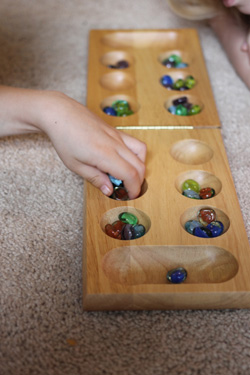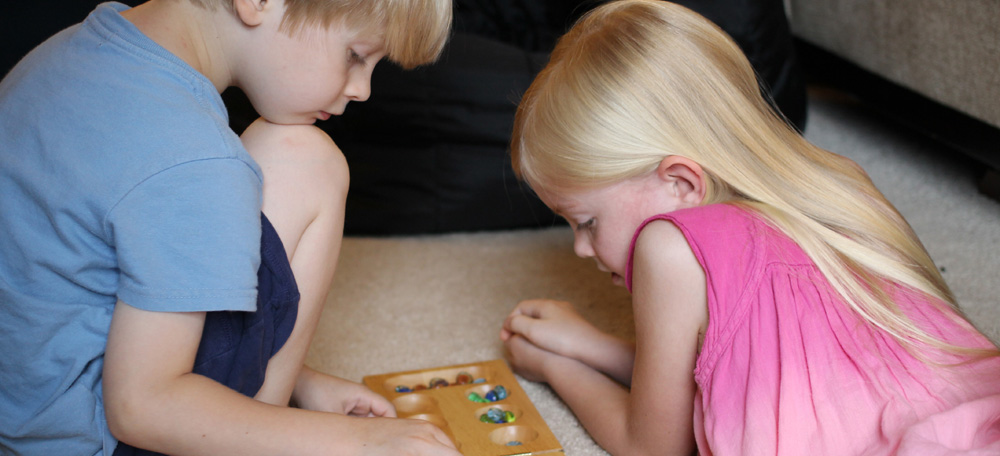Because I love math (and majored in it), it was my favorite subject to teach. Now that all my kids are grown and my homeschooling days have passed, I really miss teaching math, especially algebra. One of the reasons that I chose to homeschool was that it provided the freedom to tailor the education of my children. When homeschooling parents adopt the institutional approach to education, they miss out on so many of the beauties of homeschooling. If you are going to homeschool, take advantage of its advantages. I wanted my children to be able to learn at their own paces. I saw many problems that were caused by children being pushed to do something before they were developmentally ready. We often think of children being pushed in reading, but it also happens with math.
In her book, An Easy Start In Arithmetic, Ruth Beechick says there are three modes in which children think about math: manipulative, mental and abstract. These modes also correspond to the developmental stages of a child. While every child grows through different developmental stages at different ages, there are some generalities about these stages. First, young children learn through the manipulative stage. They need to touch, feel and move. When you, as an adult, see the problem 2+3=5, you think in the abstract mode. You understand the concept of two and three. You do not have to see and touch two blocks and three blocks. You don’t even need to picture two blocks and three blocks in your head. Preschoolers generally cannot do this; they are in the manipulative stage. Later, during elementary school, they develop the ability to do math in the mental mode. They can picture the number and the addition process, but they are still not able to understand the abstract concept of a number. This ability to understand the abstract concepts of math develops around age twelve.
It is best for a homeschooling parent to keep these developmental stages in mind while teaching math. During the early years, math concepts need to be taught with things that the child can touch, feel and manipulate. This need usually corresponds nicely with the real life of the child. Children need a lot of real-world, concrete experiences before they can internalize the meaning of numbers, arithmetic operations, geometric shapes, proportion and all the other terms, ideas, processes and relationships that are a part of mathematics.
One of the best things a homeschool parent can do is to get a good elementary math book and read it themselves. Learn the terms and concepts, and then apply these terms and concepts to your child’s everyday life. Many homeschool parents hate math and do not feel very competent to teach it. If this is true of you, you need to do this even more.
 Children come into contact with math every day. When children play with building blocks, puzzles, toy cars, when they have a natural need for counting, patterning, comparing, estimating, etc., they are building a repertoire of concrete experience. Helping mom in the kitchen or dad in the workshop offers many opportunities for real-life math. Gardening, playing a musical instrument, grocery shopping, setting the table and playing board games are all examples of activities that provide children with context and a frame of reference for future math learning. All of these things can count as school time.
Children come into contact with math every day. When children play with building blocks, puzzles, toy cars, when they have a natural need for counting, patterning, comparing, estimating, etc., they are building a repertoire of concrete experience. Helping mom in the kitchen or dad in the workshop offers many opportunities for real-life math. Gardening, playing a musical instrument, grocery shopping, setting the table and playing board games are all examples of activities that provide children with context and a frame of reference for future math learning. All of these things can count as school time.
It is so important that your children have these experiences before they start a formal math program. I actually didn’t start a formal program in a consistent way until third grade. Until that time, I did real-life math, read math books, did math activities and played math games while sporadically throwing in a few math lessons. I may have worked through a math book, but it was not a priority to get through it. Depending on the learning style of the child, aptitude for math and interest in it, they may be ready for a math program during these early elementary years. If they enjoy the process, it is fine to let them work out of a math book. A book that is fun to use during the elementary ages is Family Math. (It may be out of print, but can can probably find a used copy.) Also, the library is full of picture books with a mathematical theme. Once a child has the developmental maturity of a third grader, he is able to cover kindergarten through second grade math rather quickly and can then move on to the third grade math. A student who has had a life rich in mathematical experiences will be better able to understand the math exercises that he is now asked to do. During this stage, he is able to do mental math. He doesn’t always need the manipulatives because he is able to picture them in his head. Manipulatives are still sometimes helpful, especially when learning a new or difficult concept or process. However, be careful that you don’t expect him to be able to do the abstract thinking that is required for many math processes. He is probably not ready for that yet.
During these early years, it is much more important that they acquire an understanding of mathematical principles through real life experiences than it is to spend time in a math book. This foundation will help them to have better success in their future math studies. So, put down that math book and go play a game.




